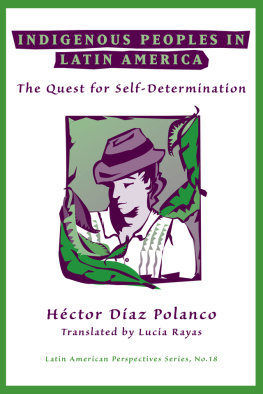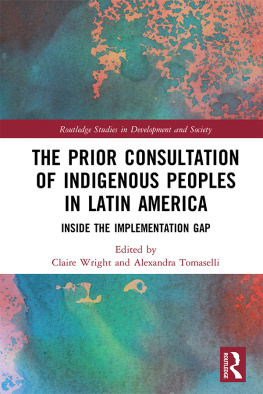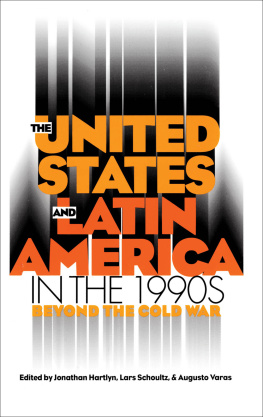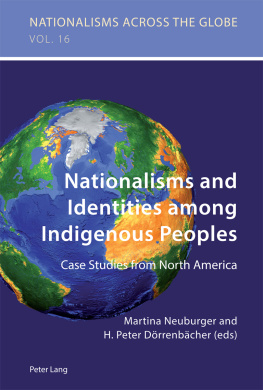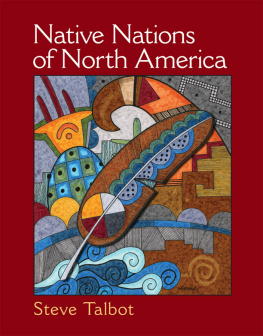INDIGENOUS PEOPLES IN LATIN AMERICA
Latin American Perspectives Series
Ronald H. Chilcote, Series Editor
Indigenous Peoples in Latin America: The Quest for Self-Deterniination, Hctor Daz Polanco
The Battle for Guatemala: Rebels, Death Squads, and U.S. Power, Susanne Jonas
The Latin American Left: From the Fall of Allende to Perestroika, edited by Barry Carr and Steve Ellner
Fidel! Castro's Political and Social Thought, Sheldon B. Liss
Revolution in the Balance: Law and Society in Contemporary Cuba, Debra Evenson
State and Society in the Dominican Republic, Emelio Betances
Capital, Power, and Inequality in Latin America, edited by Sandor Halebsky and Richard L. Harris
The State, Bureaucracy, and the Cuban Schools: Power and Participation, Sheryl L. Lutjens
Indigenous Peoples in Latin America
The Quest for Self-Determination
Hctor Daz Polanco
Translated by
Lucia Rayas
Latin American Perspectives
First published 1997 by Westview Press
Published 2018 by Routledge
711 Third Avenue, New York, NY 10017, USA
2 Park Square, Milton Park, Abingdon, Oxon OX14 4RN
Routledge is an imprint of the Taylor & Francis Group, an informa business
Copyright 1997 Taylor & Francis
All rights reserved. No part of this book may be reprinted or reproduced or utilised in any form or by any electronic, mechanical, or other means, now known or hereafter invented, including photocopying and recording, or in any information storage or retrieval system, without permission in writing from the publishers.
Notice:
Product or corporate names may be trademarks or registered trademarks, and are used only for identification and explanation without intent to infringe.
Library of Congress Cataloging-in-Publication Data
Daz Polanco, Hctor, 1944
[Autonoma regional. English]
Indigenous peoples in Latin America: the quest for self-determination / Hctor Daz Polanco;
translated by Lucia Rayas.
p. cm.(Latin American perspectives series; no. 18)
Includes bibliographical references and index.
ISBN 0-8133-8698-5 (hc.)ISBN 0-8133-8699-3 (pbk.)
1. IndiansGovernment relations. 2. IndiansPolitics and government. 3. Autonomy. 4.
Pluralism (Social sciences) 5. Latin AmericaPolitics and government. I. Title. II. Series.
E59.G6D5213 1997
323.119708dc21 96-39371
CIP
ISBN 13: 978-0-8133-8699-7 (pbk)
In previous works I have dealt with various theoretical problems associated with the ethnic-national question and the complexity of its contribution to the structure of society. Throughout these essays I have emphasized the vital political issues arising from the pluralism of the majority of Latin American nations. From that perspective, I have emphasized a theme that seems of the utmost importance for the future of these countries: the challenges and difficulties of solving the problem of sociocultural inequality and achieving national democracy in the historical context of an enduring colonial legacy and a subsequent period of independence in which insensitivity to diversity persists.
This work examines a sociopolitical policy that in various national contexts has proven to be the most appropriate way of resolving the conflicts and ameliorating the conditions of oppression, discrimination, and inequality that go hand in hand with ethnic-national heterogeneity in Latin American social life. I will call this policy regional autonomy. My analysis focuses on indigenous ethnic groups, but it will be evident that many of the questions presented here are also applicable to other collectivities that have their own identities, such as the black and criollo communities, that abound in the region.
The history of the Latin American peoples involves policies explicitly aimed at denying rights to communities considered inferior and incapable of handling their own affairs precisely because they are socioculturally different from the dominant groups. Underlying this characterization of their difference is the intention of depleting their resources, exploiting their labor forces, and dominating them ideologically and politically. Hence, the various class concerns that began to take shape from the very first contact of the European invaders with the aboriginal peoples of America presume the exclusion of any possibility of self-determination for these indigenous ethnic groups, thereby placing them in a subordinate position.
In the first section I examine the main features of the historical conditions under which indigenist policies were established as a denial of any kind of autonomy for the various groups with identities of their own.
Indigenous peoples continue to be an important part of the population of many countries in Latin America despite the coordinated action and the more subtle divisive forces that for centuries have operated to make these ethnic groups vanish from the social horizon. In four of these countries (Bolivia, Guatemala, Peru, and Ecuador), indigenous peoples constitute more than 40 percent of the national population, in the first two cases reaching nearly 70 percent. In a dozen countries, including Belize, Honduras, Mexico, and Chile, the indigenous population represents from 5 to 20 percent of the total. All in all, there are more than 50 million people who maintain indigenous lifestyles, and this population is not only growing in absolute terms but in some areas also increasing relatively.
Although quantitative criteria allow us to form an idea of the importance of ethnicity, this is not enough. One must also consider the qualitative significance of indigenous populations even where (as in Nicaragua and Brazil) they are clearly a demographic minority. This qualitative dimension stems from economic considerations such as the resources present in the regions they inhabit, geopolitical considerations (their location in strategic areas such as borders and coasts), and sociocultural considerations such as their being historical reference points and sources of national cohesion. The influence that ethnic communities can exert over national processes in spite of their demographic minority status is evident from the Nicaraguan experience of the 1980s.
Given that the dominant groups are disinclined to concede these groups their rights, being more interested in keeping them true "internal colonies," the sociopolitical premises for their recognition, can be established only through their own struggles. This seems to be the general situation in several Latin American countries, with understandable differences depending on the different national contexts. The particular situations in which such trends appear range from the achievement of a regime of regional autonomy that ethnic groups are struggling to consolidate and preserve to the first attempts to turn renewed ethnic pride into clarity of purpose and organized force. Thus, perhaps for the first time in the history of the continent, the Utopian goal of autonomy for indigenous peoples and other ethnic communities seems socially viable. Given this situation, clarifying the characteristics and implications of eventual regimes of regional autonomy in the complex Latin American context is all the more urgent. Some of these questions are addressed in the second part of the book.
I will avoid the temptation to consider autonomy a panacea, instead stressing its strict historical determination. Regional autonomy is not in fact the solution; rather, it is a means for solving problems under particular conditions. Besides, the fact that autonomy may become a suitable arrangement for indigenous peoples depends not on any mysterious categorical imperative or teleological design but on the concrete action of the sociopolitical forces that make it a reality. In this sense, autonomy is only possible, not necessary.

